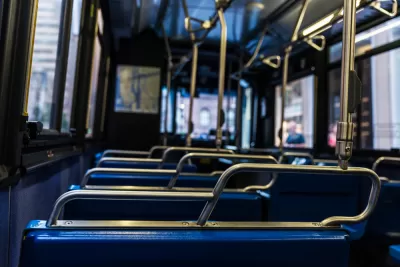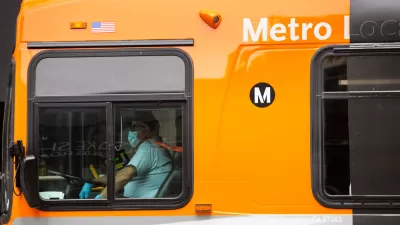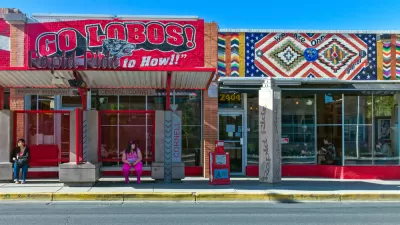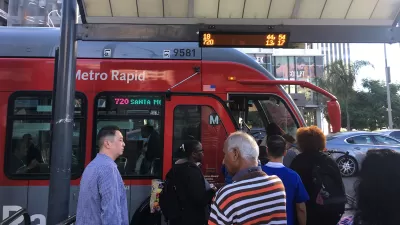“The biggest US transit agencies must be allowed to simply focus on delivering high-quality service. There is no Plan B.”

An article by David Zipper for Vox provides one of the most detailed accounts yet of the crisis facing public transit because of reduced ridership and revenues coming out of the pandemic. “Few parts of the American economy were upended by Covid as much as public transportation,” according to Zipper. As a result, the current crisis has the “potential to decimate their service, cripple local economies, and diminish quality of life.”
To escape the crisis, Zipper writes that “transit leaders must offer a full-throated defense of their essential role in American life. They must then secure new and reliable revenue streams from state and regional sources, which will require convincing residents and legislators that transit is worthy of subsidy — not an easy thing to do in a country where the vast majority of people don’t ride the bus or train.”
“The only realistic way for transit officials to garner public support for the funding they desperately need is to demonstrate an ability to replace car trips, not just serve economically disadvantaged people who lack other means to get around their city,” adds Zipper. The pro-transit arguments that resonate most with the public, according to Zipper’s argument, are “curtailing congestion, reducing auto emissions, and boosting economic growth.”
The potential for transit trips to replace car trips cannot be achieved by fare-free transit programs nor other “distractions” such as electric buses. In fact, Zipper argues that transit agencies must be encouraged to redistribute funds intended for large capital investments, such as new rail lines and new buses, to programs that increase service with existing resources.
Key to the argument is an effort to dispel the notion of fare-free transit as a solution for the current, post-pandemic era. Eliminating fares sends transit in the wrong direction, according to Zipper, by requiring “transit systems to find even more outside funding to be able to function, making it harder to provide high-quality service.” Zipper isn’t the first to argue that free fares are a setback rather than a boon for public transit—an article by Jerusalem Demsas in 2022 and an article by Steven Polzin in 2018 made the same arguments.
Instead of increasing the costs of transit, agencies and their partners at various levels of government should be focused on “establishing recurring sources of funding,” according to Zipper, such as, for example, New York City’s congestion pricing plan, “which will charge motorists up to $23 to enter Manhattan’s central business district and add around $1 billion annually to MTA’s capital budget….”
A lot more detail on how transit arrived at this crisis (with a history that dates well back into the 20th century) and more nuance on Zipper’s arguments are available to read in full at the link below.
FULL STORY: How to save America’s public transit systems from a doom spiral

Alabama: Trump Terminates Settlements for Black Communities Harmed By Raw Sewage
Trump deemed the landmark civil rights agreement “illegal DEI and environmental justice policy.”

Study: Maui’s Plan to Convert Vacation Rentals to Long-Term Housing Could Cause Nearly $1 Billion Economic Loss
The plan would reduce visitor accommodation by 25% resulting in 1,900 jobs lost.

Planetizen Federal Action Tracker
A weekly monitor of how Trump’s orders and actions are impacting planners and planning in America.

Wind Energy on the Rise Despite Federal Policy Reversal
The Trump administration is revoking federal support for renewable energy, but demand for new projects continues unabated.

Passengers Flock to Caltrain After Electrification
The new electric trains are running faster and more reliably, leading to strong ridership growth on the Bay Area rail system.

Texas Churches Rally Behind ‘Yes in God’s Back Yard’ Legislation
Religious leaders want the state to reduce zoning regulations to streamline leasing church-owned land to housing developers.
Urban Design for Planners 1: Software Tools
This six-course series explores essential urban design concepts using open source software and equips planners with the tools they need to participate fully in the urban design process.
Planning for Universal Design
Learn the tools for implementing Universal Design in planning regulations.
Caltrans
Smith Gee Studio
Institute for Housing and Urban Development Studies (IHS)
City of Grandview
Harvard GSD Executive Education
Toledo-Lucas County Plan Commissions
Salt Lake City
NYU Wagner Graduate School of Public Service





























